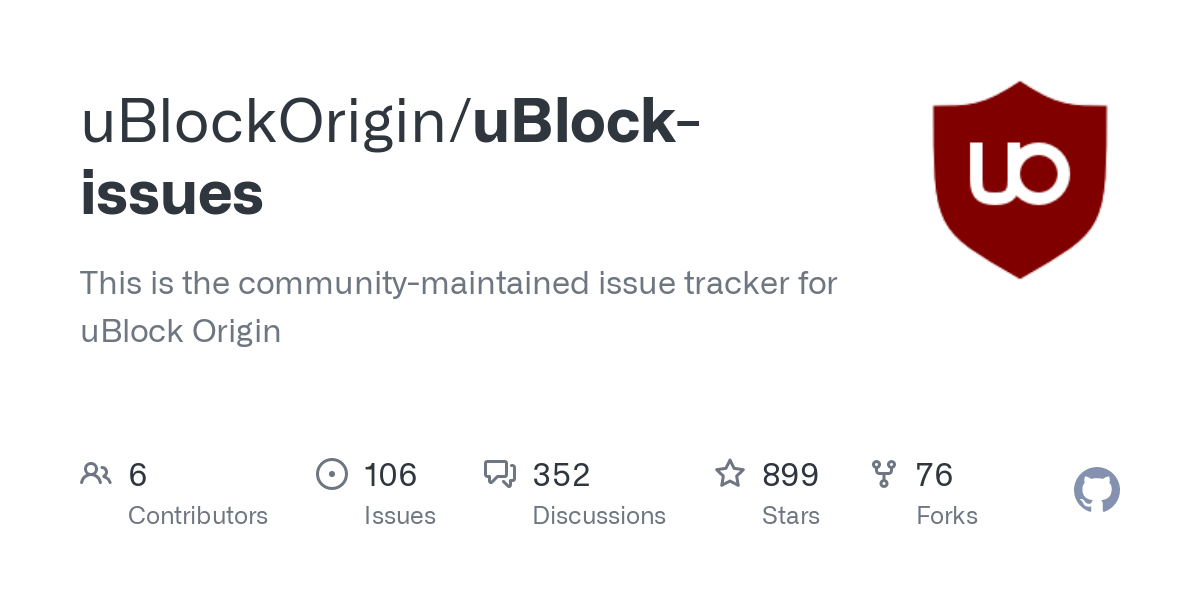- cross-posted to:
- lealternative
- cross-posted to:
- lealternative
EDIT: Apologies. Updated with a link to what gorhill REALLY said:
Manifest v2 uBO will not be automatically replaced by Manifest v3 uBOL[ight]. uBOL is too different from uBO for it to silently replace uBO – you will have to explicitly make a choice as to which extension should replace uBO according to your own prerogatives.
Ultimately whether uBOL is an acceptable alternative to uBO is up to you, it’s not a choice that will be made for you.
Will development of uBO continue? Yes, there are other browsers which are not deprecating Manifest v2, e.g. Firefox.



Comment from gorhill (the developer of uBO and uBOL):
https://www.reddit.com/r/uBlockOrigin/comments/1ejhpu5/comment/lgdmthd/
“uBlock Origin developer slams NeoWin, backpedals on recommendation!” —NeoWin editors, probably.
Sounds about right for any news outlet. “Slams” is so overused, and usually nowhere near an accurate euphamism.
How did supposedly intellectual people ever conclude that we should use the word “slam” on the daily in headlines?
It’s straight out of Idiocracy and I will never get used to it.
Ragebait gets more clicks.
Well yes, obviously. My question is more about how they pretend it’s not just ragebait.
Very simple, they learned not to care and the ones who did care got weeded out.
Intellectual? Shit, that doesn’t pay.
Unless you’re lucky enough to get tenure, or stumble upon a fact of the universe that no one knew and just happens to be relevant to a modern economy.
Because not only is it emotive (and they love emotive language to get you to click), it’s also just an objectively fantastic word for a headline in that it’s very concise and helps headlines fit on a single line.
Headline space is limited, so it’s easier to go with “X slams Y over Z” as opposed to “X criticises Y over Z” or “X denounces Y over Z” or “X castigates Y over Z”
It’s annoying how much it’s seen. But I get why they do it.
100% disagree
All of these are better. They’re honest about what’s happening and most people understand them. “Slams” implies some level of violence or at least force. Not only isn’t that dishonest most of the time, it could devalue the word to that point that it just simply has no meaning. I refuse to internalize it as best as I can, but if they had their way I would think “slam” means a brutal vitriolic takedown. Instead I know it normally means “mildly comments on” these days.
Fuck “slam” in headlines.
You’re interpreting me saying “it’s objectively good in headlines because it’s extremely short and clear what it means” as “I love it when they say ‘slams’!”
I was very explicit in saying I don’t like it. It’s just objectively (not subjectively) a good word for headlines.
I am not making an emotional argument to you. I’m just answering the question of why they use it. If you didn’t actually want an answer to the question, you should’ve made it clearer it was a rhetorical question.
No they aren’t, for the very reason I already stated. They aren’t concise, which is paramount when it comes to crafting a headline.
Slam does not imply violence or force lol.
I thought it’s clear when we ask a question that can’t actually be answered, because thousands of journalists are not one person we can ask, it’s not meant to be taken 100% literally.
Of course it does. That’s 100% the only reason why they use it this way. Notice how that’s explicit in every definition but the last (the newer, still less-common usage I’m taking issue with):
I love when people want to quibble about word definitions, being super strict or loose whenever it suits them. In the real world, people use words loosely and over time the connotation changes. Hence definition 4’s existence here.
My main problem with using the word this way is that it’s rarely honest. I am annoyed by it because it sounds stupid, but like I said, more importantly:
From your screenshot: to criticize harshly
Except… it can, because I did? We’re talking about a common industry practice here, not some enigmatic unsolvable mystery of the universe.
No.
Oh is it? Do you have an assertion for that? You really think that when they say “X slams Y” they’re trying to make you think there’s a physical altercation going on?
You’ll notice I said in the context of headlines. Of course in other contexts slam can mean violence. But because we’re specifically talking about headlines here, not, say, discussing a WWE performance, it’s very obvious what “slams” means.
You’re really going into the weeds here. You asked why they use “slams” in headlines so often, and I gave you an answer. I don’t see why you feel the need to argue about it so much.
They use it because people understand what it means, it’s emotive, and it’s very concise compared to “criticises”, “chastises”, “denounces”, “castigates”, or “attacks”
Actually, based on your previous argument, you’d probably hate it if they said “attacks” too, as you could also interpret it as violence.